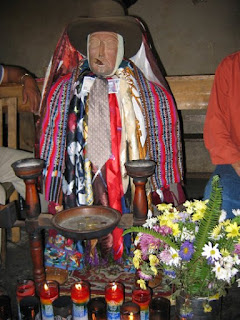People describe him as a "saint, devil, doctor, trickster, and the grandfather of the village who protected the inhabitants from evil and witches" (Life is a Trip, Judith Fein). A man from the city of Guatemala came and explained Judith that he is a divinity which understands human nature, its vices and sins. People worshiped him because he offers forgiveness to everyone because he is a sinner also. He accepts people as they are and does not look at their imperfections. Here is a video in which you can see Maximon and the people who worship him.
I guess, in the end, its not about your errors, your sins, your wrongdoings, its how you handle the situation, how you make amends which differentiates us from other people. Similar to the activity done in class. If you take a piece of paper and crumble it up you may try to eliminate the wrinkles but it is nearly impossible. We must learn to live with our imperfections and strive to do good always, but remembering that our human nature is ever present.


The paper metaphor was excellent ! It is true that we must learn to live with our imperfections because no matter how hard we try, perfection is an impossible task. Being human is to be imperfect.
ReplyDeleteThis comment has been removed by the author.
ReplyDeleteLiving with the errors you make can be so hard, but when the author saw this divinity who sins, I think it became easier for her to forgive herself. Like you said, it is only human nature to make mistakes.
ReplyDelete